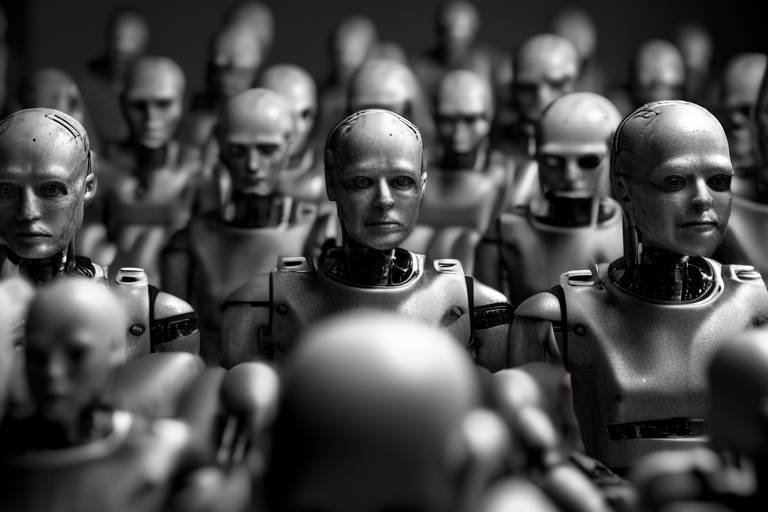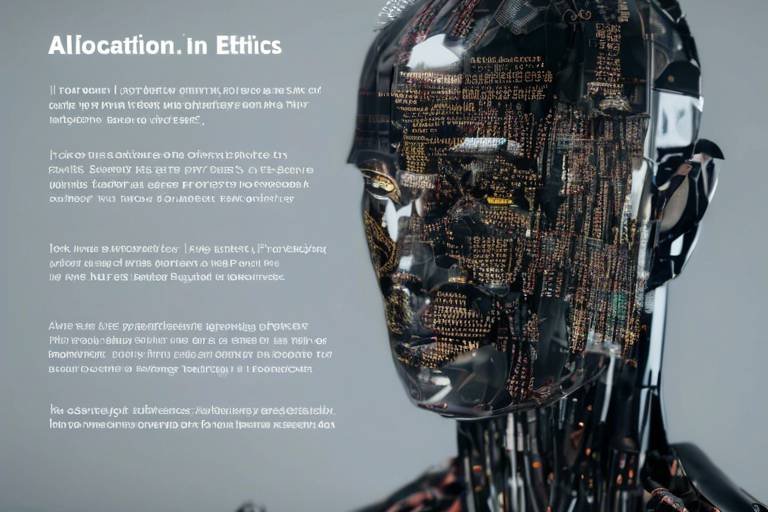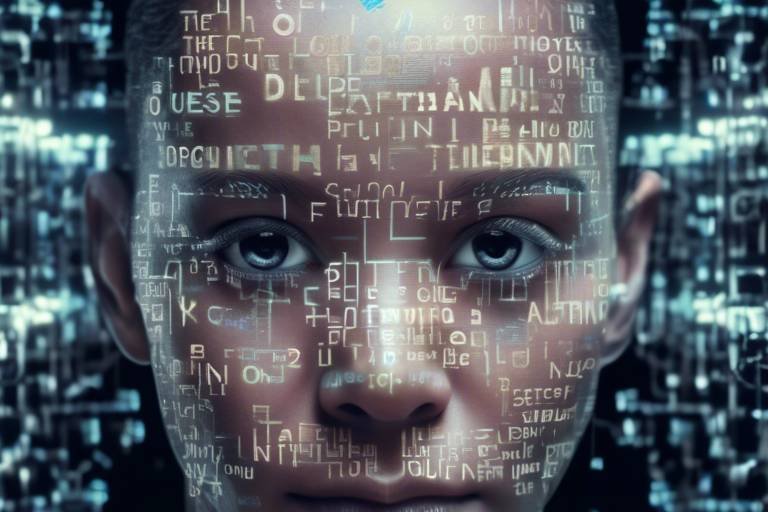Understanding The Ethics of AI: A Beginner's Guide
Artificial Intelligence (AI) is revolutionizing our world, impacting everything from healthcare to transportation. However, as we embrace this technology, we must also confront the ethical dilemmas it presents. What does it mean to develop AI responsibly? This question is at the heart of AI ethics, a field that examines the moral implications of AI technologies. In this article, we will explore the foundational principles of AI ethics, the importance of ethical considerations, and the challenges we face in navigating this complex landscape.
AI ethics refers to the moral principles guiding the development and implementation of artificial intelligence technologies. It encompasses a broad range of issues, including fairness, accountability, transparency, and the overall impact on society. As AI systems become increasingly integrated into our daily lives, understanding these ethical considerations is crucial. For instance, when an AI algorithm makes decisions that affect people's lives—like whether someone gets a loan or a job—it's essential to ensure that these decisions are made fairly and without bias.
Why should we care about ethical AI? The answer is simple: ethical AI is crucial for ensuring that AI systems benefit humanity, minimize harm, and promote social good. Without a strong ethical framework, AI technologies can perpetuate existing biases, invade privacy, and even threaten security. Consider the following points:
- Bias and Discrimination: AI systems trained on biased data can lead to unfair outcomes.
- Privacy Concerns: The collection and use of personal data raise significant ethical questions.
- Security Implications: Unregulated AI can lead to harmful applications, such as surveillance and misinformation.
To navigate the ethical landscape of AI, we must adhere to certain fundamental principles:
| Principle | Description |
|---|---|
| Fairness | Ensuring that algorithms do not perpetuate bias or discrimination. |
| Accountability | Developers and organizations must be responsible for AI outcomes. |
| Transparency | AI systems should be understandable and explainable to users. |
| Respect for Privacy | Users' data should be handled with care and respect for their autonomy. |
Fairness in AI involves ensuring that algorithms do not perpetuate bias or discrimination. Imagine a hiring algorithm that favors certain demographics over others—this not only harms individuals but also undermines the integrity of the organization using it. By promoting equitable treatment across different demographics and societal groups, we can ensure that AI serves as a tool for inclusion rather than exclusion.
Accountability is another cornerstone of ethical AI. Developers and organizations must take responsibility for the outcomes of their AI systems. This means having mechanisms in place to address failures or harmful impacts. For example, if an AI system makes a flawed decision, there should be a clear path for users to seek redress. This accountability fosters trust and encourages responsible innovation.
The ethical landscape of AI is fraught with challenges. Technological limitations can hinder our ability to create fair and transparent systems. Additionally, varying cultural norms complicate ethical decision-making, as what is considered ethical in one society may not be viewed the same way in another. The rapid pace of AI advancement also poses a challenge—by the time we establish ethical guidelines, the technology may have already evolved.
To address these challenges, various regulatory frameworks are being developed. Governments and industry organizations are striving to create guidelines that ensure ethical AI practices. These frameworks aim to balance innovation with public interest and societal welfare.
Countries around the world are working on regulations to govern AI technologies. These regulations often reflect differing cultural values and societal needs. For instance, the European Union has proposed stringent regulations focused on transparency and accountability, while other regions may prioritize innovation over regulation. Understanding these global perspectives is essential for developing universally accepted ethical standards.
In addition to governmental regulations, industry organizations are establishing guidelines and best practices for ethical AI development. By promoting responsible innovation, these standards help foster trust among users and stakeholders. Organizations that adhere to ethical principles are more likely to gain public trust, which is vital for the successful deployment of AI technologies.
Stakeholders—developers, policymakers, and users—play a critical role in shaping the ethical landscape of AI. Each group brings unique perspectives that are essential for informed decision-making. Developers must prioritize user safety and privacy, while policymakers create regulations that balance innovation with public interest. Users, on the other hand, must advocate for their rights and ensure that their voices are heard in the development of AI technologies.
AI developers have a responsibility to create systems that adhere to ethical guidelines. This means prioritizing user safety, privacy, and fairness throughout the development process. By doing so, they not only comply with ethical standards but also contribute to a more equitable society.
Policymakers are essential in creating regulations and frameworks that guide ethical AI practices. Their role is to strike a balance between fostering innovation and protecting public interest. By engaging with various stakeholders, they can develop comprehensive policies that address the complex ethical challenges posed by AI.
- What is AI ethics? AI ethics refers to the moral principles guiding the development and implementation of AI technologies.
- Why is ethical AI important? Ethical AI ensures that AI systems benefit humanity and minimize harm.
- What are the key ethical principles in AI? Fairness, accountability, transparency, and respect for privacy are some of the key principles.
- What challenges exist in AI ethics? Challenges include technological limitations, cultural differences, and the rapid pace of AI advancement.

What is AI Ethics?
AI ethics refers to the moral principles that guide the development and implementation of artificial intelligence technologies. As AI becomes increasingly integrated into our daily lives, it's vital to understand the ethical implications of these systems. Imagine AI as a powerful tool, much like a double-edged sword. It has the potential to bring about incredible advancements, but if wielded irresponsibly, it can also cause significant harm. This duality is at the heart of AI ethics.
At its core, AI ethics focuses on several key elements that ensure these technologies operate fairly and responsibly. These elements include:
- Fairness: Ensuring that AI systems do not perpetuate bias or discrimination.
- Accountability: Holding developers and organizations responsible for the outcomes of AI systems.
- Transparency: Making AI systems understandable and their decision-making processes clear.
- Privacy: Respecting user privacy and ensuring data protection.
As we delve deeper into the world of AI, we must consider the impact these technologies have on society. For instance, AI systems are increasingly being used in critical areas such as healthcare, finance, and law enforcement. Each of these sectors has profound implications for individuals and communities. If an AI system used in healthcare makes biased decisions regarding treatment options, it could adversely affect patient outcomes. Similarly, in finance, biased algorithms could lead to unfair lending practices. Therefore, understanding AI ethics is not just an academic exercise; it is essential for safeguarding human rights and promoting social good.
Moreover, the rapid evolution of AI technology adds another layer of complexity to ethical considerations. As AI systems become more sophisticated, the ethical dilemmas they pose also become more intricate. This is why ongoing dialogue among developers, policymakers, and the public is crucial. Engaging in discussions about AI ethics helps to foster a collective understanding of the challenges and responsibilities associated with these technologies.
In summary, AI ethics is about ensuring that as we harness the power of artificial intelligence, we do so in a way that is fair, accountable, transparent, and respectful of individual rights. By prioritizing these principles, we can work towards a future where AI serves as a force for good, benefiting all of humanity.

The Importance of Ethical AI
In today's fast-paced digital world, the significance of ethical AI cannot be overstated. As artificial intelligence becomes increasingly integrated into our daily lives, it is vital to ensure that these systems are designed and implemented with a strong moral foundation. Ethical AI is not just a buzzword; it's a necessity for fostering trust and ensuring that technology serves humanity rather than harms it. Imagine a world where AI systems operate without bias, where decisions made by machines are transparent and accountable. This is the vision that ethical AI aims to achieve.
One of the primary reasons ethical AI is crucial is its potential to benefit humanity. When developed responsibly, AI technologies can enhance productivity, improve healthcare outcomes, and provide personalized learning experiences. However, without a focus on ethics, these advancements could lead to significant societal challenges. For instance, if AI systems are allowed to operate without oversight, they might inadvertently perpetuate existing biases, leading to unfair treatment of certain groups. This is why it is essential to implement ethical guidelines that prioritize fairness and equity.
Furthermore, ethical AI plays a pivotal role in addressing concerns related to privacy and security. In an age where data breaches and privacy violations are rampant, it is more important than ever to establish robust standards that protect user information. Ethical AI encourages developers to prioritize user consent and data protection, fostering a culture of accountability. This not only safeguards individuals' rights but also builds public trust in AI technologies.
Another critical aspect of ethical AI is its ability to promote social good. By aligning AI development with ethical principles, we can ensure that technology is harnessed to tackle pressing global issues, such as climate change, poverty, and healthcare disparities. Ethical AI can empower organizations to create solutions that not only drive profit but also contribute positively to society. For example, AI-driven initiatives in renewable energy can lead to more efficient resource management, ultimately benefiting the planet and future generations.
In summary, the importance of ethical AI lies in its potential to create a fair, transparent, and secure technological landscape. By prioritizing ethical considerations, we can ensure that AI systems are designed to uplift humanity, protect individual rights, and foster social good. As we continue to advance in the field of artificial intelligence, let us commit to developing technologies that reflect our highest moral standards and serve as a force for positive change.
- What are the main principles of ethical AI? The main principles include fairness, accountability, transparency, and respect for user privacy.
- Why is accountability important in AI? Accountability ensures that developers and organizations are responsible for the outcomes of AI systems, allowing for mechanisms to address failures or harmful impacts.
- How can ethical AI benefit society? Ethical AI can enhance productivity, improve healthcare, and address social issues, ultimately leading to a more equitable and just society.
- What role do policymakers play in ethical AI? Policymakers are essential in creating regulations that guide ethical AI practices, balancing innovation with public interest.

Key Ethical Principles
When diving into the world of artificial intelligence, it’s crucial to understand the that should guide its development. These principles serve as the moral compass for developers, organizations, and policymakers alike. They ensure that AI technologies are not only innovative but also responsible and beneficial to society. Let's explore these principles in detail.
First and foremost is the principle of fairness. Fairness in AI is about creating systems that do not inadvertently reinforce existing biases or discrimination. Imagine a world where an AI system decides who gets a loan based solely on historical data; if that data reflects past prejudices, the AI could perpetuate those injustices. Therefore, it’s essential to ensure that algorithms are designed to promote equitable treatment across various demographics. This can be achieved through rigorous testing and validation processes that actively seek out and mitigate bias.
Next up is accountability. In the fast-paced world of AI, developers and organizations must take responsibility for the outcomes of their systems. This means establishing clear lines of accountability for AI decisions and ensuring that there are mechanisms in place to address any failures or harmful impacts. For instance, if an autonomous vehicle gets into an accident, who is held accountable? The developers, the manufacturers, or the AI itself? These questions highlight the need for a robust framework that addresses liability and responsibility.
Another critical principle is transparency. Users and stakeholders should have a clear understanding of how AI systems operate and make decisions. This transparency fosters trust and enables users to make informed choices about the technologies they engage with. For example, if a job recruitment tool uses AI to screen candidates, it should be clear how the algorithm evaluates resumes. This way, candidates can understand what factors influence their chances of being selected and can challenge any decisions they believe are unfair.
Finally, we must consider the principle of respect for user privacy and autonomy. As AI systems often rely on vast amounts of personal data, it’s vital to handle this information with care. Users should have control over their data, understanding how it’s collected, stored, and used. This principle emphasizes the importance of obtaining informed consent and safeguarding user data against breaches and misuse. After all, in a world where data is the new oil, protecting it is not just an ethical obligation; it’s a necessity.
To summarize, the key ethical principles of AI—fairness, accountability, transparency, and respect for user privacy—are essential in guiding the responsible development and implementation of these technologies. By adhering to these principles, we can work towards an AI landscape that not only drives innovation but also aligns with our societal values and aspirations.
- What is AI ethics? AI ethics refers to the moral principles that guide the development and use of artificial intelligence technologies.
- Why is ethical AI important? Ethical AI ensures that AI systems are beneficial to humanity and help minimize harm, addressing issues like bias and privacy.
- What are the key ethical principles of AI? The key principles include fairness, accountability, transparency, and respect for user privacy.
- How can we ensure fairness in AI? By testing algorithms for bias and ensuring equitable treatment across demographics.
- Who is responsible for AI outcomes? Developers and organizations must take accountability for the results produced by their AI systems.

Fairness in AI
Fairness in AI is not just a buzzword; it’s a fundamental principle that lies at the heart of ethical artificial intelligence development. Imagine a world where algorithms decide your fate—whether you get a loan, a job, or even a place to live. Now, what if these algorithms are biased? It’s like giving a magician a deck of cards that’s rigged to favor certain players. The outcome is skewed, and the magic turns into a nightmare for those left out. Fairness in AI aims to ensure that these algorithms treat everyone equitably, without perpetuating existing biases or discrimination.
To truly grasp the significance of fairness, we must acknowledge that AI systems learn from historical data. If that data reflects societal biases—say, in hiring practices or law enforcement—AI can inadvertently amplify those biases. For instance, if an AI is trained on data where a particular demographic group has historically been underrepresented, it might unfairly disadvantage individuals from that group in decision-making processes. This raises the question: how do we ensure that AI promotes equity rather than inequality?
One approach to achieving fairness in AI is through rigorous testing and validation of algorithms. Developers must actively seek out and eliminate biases during the development process. This can involve:
- Conducting audits of training data to identify and rectify imbalances.
- Implementing fairness metrics to evaluate the performance of AI systems across different demographic groups.
- Engaging with diverse communities to gather insights and perspectives that inform algorithm design.
Moreover, fairness isn’t a one-time fix; it’s an ongoing commitment. As societal norms evolve, so too must the algorithms that govern our lives. Continuous monitoring and adaptation are essential to ensure that AI systems remain fair and just. This calls for a collaborative effort among developers, ethicists, and community stakeholders to foster an environment where fairness is prioritized.
In summary, fairness in AI is about more than just avoiding bias; it’s about creating systems that actively promote justice and equity in our society. It’s a challenging journey, but one that is crucial for building trust in AI technologies. After all, if we want AI to work for everyone, we must ensure it treats everyone fairly.

Accountability in AI
Accountability in AI is not just a buzzword; it's a fundamental principle that ensures developers and organizations take responsibility for the outcomes of their artificial intelligence systems. Imagine a world where AI makes decisions that impact our lives—be it in healthcare, finance, or even daily conveniences like smart home devices. If something goes wrong, who do we turn to? This is where accountability plays a pivotal role. It establishes a framework for identifying who is responsible for the actions and decisions made by AI systems.
One of the most pressing issues in AI accountability is the challenge of determining liability when an AI system causes harm or makes a mistake. For instance, if an autonomous vehicle gets into an accident, is the manufacturer liable, or is it the software developer? This gray area can lead to significant legal and ethical dilemmas. Thus, it's crucial to develop clear guidelines that outline the responsibilities of all parties involved in the AI development process.
To foster accountability, organizations should implement several key practices:
- Establish Clear Ownership: Define who is responsible for each aspect of the AI system, from development to deployment.
- Implement Auditing Mechanisms: Regularly review AI systems to ensure they are functioning as intended and adhering to ethical standards.
- Encourage Transparency: Make AI decision-making processes understandable and accessible to users, allowing them to see how and why decisions are made.
- Develop Response Protocols: Create protocols for addressing failures or harmful impacts caused by AI systems, ensuring that there is a clear path for accountability.
Moreover, accountability in AI isn't just about assigning blame; it's about creating a culture of responsibility. Developers should integrate ethical considerations into every stage of the AI lifecycle, from conception to deployment. This proactive approach can significantly reduce risks and enhance trust among users. When people know that there are systems in place to hold developers accountable, they are more likely to embrace AI technologies.
In summary, accountability in AI is a multifaceted issue that requires collaboration among developers, organizations, and policymakers. By establishing clear guidelines and fostering a culture of responsibility, we can ensure that AI technologies not only advance innovation but also protect the interests and rights of individuals. The road ahead may be complex, but with a commitment to accountability, we can navigate the ethical landscape of AI more effectively.
- What does accountability in AI mean? Accountability in AI refers to the responsibility developers and organizations have for the outcomes produced by their AI systems, ensuring that there are mechanisms to address failures or harmful impacts.
- Why is accountability important in AI? Accountability is crucial to build trust among users, promote ethical practices, and ensure that AI systems are used responsibly and safely.
- How can organizations enforce accountability in AI? Organizations can enforce accountability by establishing clear ownership, implementing auditing mechanisms, encouraging transparency, and developing response protocols for AI failures.

Challenges in AI Ethics
The realm of AI ethics is not without its hurdles. As we dive deeper into the world of artificial intelligence, we encounter a myriad of challenges that complicate ethical decision-making. One of the most pressing issues is the technological limitations inherent in AI systems. These limitations can lead to unintended consequences, such as biased outcomes or misinterpretations of data. For instance, an AI trained on skewed datasets may inadvertently reinforce existing stereotypes, perpetuating inequality rather than promoting fairness.
Another significant challenge is the varying cultural norms across different societies. What may be considered ethical in one culture could be viewed as unacceptable in another. This divergence makes it difficult to establish universal ethical standards for AI. For example, privacy expectations can vastly differ; some cultures prioritize individual privacy, while others may value communal sharing of information. This inconsistency can create friction when deploying AI technologies globally.
Moreover, the rapid pace of AI advancement adds another layer of complexity. As technology evolves at breakneck speed, ethical guidelines often lag behind. This disconnect can lead to scenarios where AI systems are deployed without adequate ethical oversight, resulting in harmful impacts on individuals and communities. The challenge lies in keeping up with technological innovations while ensuring that ethical considerations are not sacrificed in the name of progress.
To further illustrate these challenges, consider the following table that summarizes key issues in AI ethics:
| Challenge | Description |
|---|---|
| Technological Limitations | Inherent biases in data and algorithms can lead to unfair outcomes. |
| Cultural Norms | Diverse ethical perspectives across cultures complicate standardization. |
| Pace of Advancement | Rapid AI development often outpaces the creation of ethical guidelines. |
In addition to these factors, there is also the challenge of public awareness and understanding of AI technologies. Many people are unaware of how AI systems operate, which can lead to mistrust and fear. This lack of understanding can hinder the development of ethical AI, as stakeholders may not engage in meaningful discussions about the implications of these technologies. Therefore, fostering an informed public discourse is crucial for navigating the ethical landscape of AI.
In conclusion, the challenges in AI ethics are multifaceted and require a collaborative approach from all stakeholders involved. By acknowledging these hurdles, we can work towards developing AI systems that are not only innovative but also ethical, ensuring that they serve humanity positively and equitably.
- What are the main ethical concerns surrounding AI?
The primary concerns include bias, privacy, accountability, and the potential for misuse of AI technologies.
- Why is fairness important in AI?
Fairness ensures that AI systems do not discriminate against individuals based on race, gender, or other characteristics, promoting equity in decision-making processes.
- How can stakeholders contribute to ethical AI development?
Stakeholders can engage in discussions, advocate for responsible practices, and support regulations that prioritize ethical considerations in AI.

Regulatory Frameworks for AI
The rapid evolution of artificial intelligence (AI) has sparked a global conversation regarding the need for regulatory frameworks that ensure ethical practices in the development and deployment of these technologies. As AI systems become increasingly integrated into our daily lives, the potential for misuse or unintended consequences grows, making it imperative to establish rules and guidelines that govern their use. These frameworks serve as a roadmap for developers, organizations, and policymakers, ensuring that AI technologies are not only innovative but also responsible and aligned with societal values.
Currently, various countries around the world are grappling with how to regulate AI effectively. The challenge lies in balancing innovation with public safety and ethical considerations. Some nations have taken a proactive approach, implementing comprehensive laws and guidelines, while others are still in the early stages of formulating their strategies. Below is a table summarizing some of the key initiatives undertaken by different countries:
| Country | Regulatory Initiative | Focus Areas |
|---|---|---|
| European Union | AI Act | Safety, Accountability, Transparency |
| United States | AI Bill of Rights | Privacy, Fairness, Non-discrimination |
| China | New Generation AI Development Plan | Innovation, Security, Ethical Standards |
| Canada | Directive on Automated Decision-Making | Accountability, Transparency, Human Rights |
As evident from the table, each country approaches AI regulation with its unique set of priorities and cultural values. For instance, the European Union’s AI Act emphasizes safety and accountability, reflecting its commitment to protecting citizens from potential AI-related harms. On the other hand, the United States is focusing on the rights of individuals, ensuring that AI systems do not infringe upon privacy or promote discrimination.
Moreover, industry standards are also emerging as a vital component of the regulatory landscape. Organizations such as the Institute of Electrical and Electronics Engineers (IEEE) and the International Organization for Standardization (ISO) are actively working on creating guidelines that foster ethical AI development. These standards aim to provide a framework that not only encourages innovation but also instills trust among users and stakeholders.
In conclusion, the regulatory frameworks for AI are still evolving, and their effectiveness will depend on continuous dialogue among all stakeholders involved. As AI technology progresses, so too must our approaches to regulation, ensuring that ethical considerations remain at the forefront of AI development. The future of AI is not just about technological advancement; it’s about creating a society where these advancements serve the greater good.
- What are the main goals of AI regulations? The primary goals include ensuring safety, promoting transparency, addressing bias, and protecting user privacy.
- Are there global standards for AI ethics? While there are various initiatives, global standards are still being developed as countries navigate their unique cultural and legal contexts.
- How can individuals contribute to ethical AI development? Individuals can advocate for responsible AI practices, educate themselves and others about AI ethics, and support organizations that prioritize ethical considerations.

Global AI Regulations
The landscape of artificial intelligence is rapidly evolving, and with it, the need for robust global regulations has never been more critical. As AI technologies become more integrated into our daily lives, governments worldwide are stepping up to establish frameworks that ensure these innovations are both safe and ethical. The challenge, however, lies in the fact that each country has its own cultural values, societal needs, and technological capacities, which can lead to a patchwork of regulations that may not align.
For instance, the European Union has been at the forefront of AI regulation with its proposed AI Act, aiming to create a comprehensive legal framework that categorizes AI systems based on their risk levels. This legislation emphasizes the importance of transparency and accountability, requiring companies to disclose how their AI systems make decisions and to ensure that these systems are free from bias. On the other hand, countries like the United States are still in the early stages of developing a cohesive regulatory approach, often relying on existing laws to address specific AI-related issues.
Moreover, countries such as China are implementing their own set of regulations that focus on the rapid deployment of AI technologies while also emphasizing state control over data and privacy. This divergence highlights a critical issue: the need for international cooperation and dialogue to create standards that can be universally accepted. Without a common ground, there is a risk of creating barriers to innovation and stifling the potential benefits of AI across borders.
To illustrate the differences in global AI regulations, consider the following table:
| Country | Regulatory Approach | Key Focus Areas |
|---|---|---|
| European Union | Proposed AI Act | Transparency, Accountability, Risk Assessment |
| United States | Sector-specific guidelines | Innovation, Existing Legal Frameworks |
| China | State-controlled regulations | Data Security, National Interests |
As we can see, the regulatory approaches vary significantly, reflecting each region's priorities and challenges. This inconsistency can lead to confusion for companies operating on a global scale, as they must navigate different regulatory environments while trying to maintain ethical standards. It's essential for stakeholders, including businesses and policymakers, to engage in continuous dialogue and collaboration to harmonize these regulations, ensuring that AI development is both responsible and beneficial for society as a whole.
In summary, the establishment of global AI regulations is not just about compliance; it's about fostering an environment where innovation can thrive while ensuring that ethical considerations are at the forefront. As we move forward, the collaboration between countries will be pivotal in shaping a future where AI serves humanity positively and responsibly.
- What are the main goals of AI regulations?
AI regulations aim to ensure safety, promote ethical practices, and protect user privacy while fostering innovation. - How do different countries approach AI regulation?
Countries vary in their approaches, with some focusing on comprehensive legal frameworks while others rely on existing laws tailored to specific industries. - Why is international cooperation important for AI regulations?
International cooperation helps create consistent standards, reducing confusion for companies and ensuring that ethical considerations are universally applied.

Industry Standards for Ethical AI
As artificial intelligence continues to permeate various sectors, the establishment of has become increasingly important. These standards serve as a compass for organizations and developers, guiding them toward responsible innovation while ensuring that the technologies they create do not inadvertently cause harm. The landscape of AI is dynamic, and with its rapid evolution, the need for robust frameworks that promote ethical practices cannot be overstated.
One of the key aspects of these standards is the promotion of transparency. Transparency in AI means that organizations should be open about how their algorithms work, the data they use, and the decisions made by AI systems. This openness fosters trust among users and stakeholders, allowing them to understand the implications of AI technologies. For instance, if a financial institution employs an AI algorithm to assess creditworthiness, it should be clear how the AI arrived at its decisions, ensuring that users can challenge or question outcomes that seem unfair.
In addition to transparency, ethical AI standards emphasize the importance of accountability. Developers and companies must take responsibility for the actions of their AI systems. This can be achieved by implementing mechanisms that allow for audit trails, enabling external parties to review AI decision-making processes. Accountability ensures that when AI systems fail or cause harm, there are clear pathways for redress and improvement.
Furthermore, industry standards often advocate for diversity and inclusivity in AI development teams. A diverse team is more likely to recognize potential biases in algorithms and make decisions that reflect a wider range of perspectives. This is crucial in preventing the perpetuation of existing societal biases, which can occur if AI systems are developed in homogenous environments. By bringing together individuals from various backgrounds, organizations can create AI solutions that are fairer and more representative of the populations they serve.
To illustrate the significance of these standards, let's consider a table that outlines key components of industry standards for ethical AI:
| Component | Description |
|---|---|
| Transparency | Clear communication about AI algorithms, data usage, and decision-making processes. |
| Accountability | Establishing mechanisms to ensure responsible AI outcomes and enabling audits. |
| Diversity | Encouraging diverse teams to mitigate biases and enhance the development process. |
| Privacy | Protecting user data and ensuring compliance with privacy regulations. |
| Safety | Implementing safeguards to prevent AI systems from causing harm. |
In conclusion, the establishment of industry standards for ethical AI is not just a regulatory requirement; it is a moral imperative. By adhering to these standards, organizations can foster a culture of responsibility and trust in AI technologies. As stakeholders in the AI ecosystem, it is crucial for developers, policymakers, and users to collaborate in shaping these standards, ensuring that the benefits of AI are realized without compromising ethical principles.
- What are the main goals of ethical AI standards? The primary goals include promoting transparency, accountability, diversity, and user privacy while ensuring that AI technologies do not cause harm.
- Why is diversity important in AI development? Diversity helps identify and mitigate biases in AI systems, leading to fairer outcomes that reflect the needs of a broader population.
- How can organizations ensure accountability in AI? Organizations can implement audit trails and mechanisms for redress to hold themselves accountable for the outcomes of their AI systems.

The Role of Stakeholders in AI Ethics
The ethical landscape of artificial intelligence is not shaped by a single entity; rather, it is a collaborative effort involving multiple stakeholders. Each group plays a pivotal role in ensuring that AI technologies are developed and implemented responsibly. These stakeholders include developers, policymakers, and users, all of whom contribute unique perspectives and responsibilities that influence the ethical use of AI.
Firstly, let's delve into the responsibilities of developers. AI developers are the architects of these intelligent systems, and with that power comes a significant obligation. They must prioritize ethical guidelines throughout the development process. This means not only focusing on technical excellence but also considering the societal impacts of their creations. Developers are tasked with ensuring that AI systems are designed with user safety, privacy, and fairness at the forefront. In a world where algorithms can influence everything from hiring practices to loan approvals, developers must be vigilant against biases that may inadvertently seep into their models.
Next, we turn our attention to policymakers. These individuals are crucial in creating a regulatory framework that guides ethical AI practices. They must balance the need for innovation with the public interest and societal welfare. Policymakers are responsible for establishing laws and regulations that not only promote technological advancement but also protect citizens from potential harms associated with AI. This involves engaging with various stakeholders to understand the implications of AI technologies and ensuring that diverse voices are heard in the legislative process.
Moreover, the role of users cannot be understated. As the end consumers of AI technologies, users have a significant impact on how these systems are perceived and utilized. Their feedback can drive developers to improve transparency and fairness in AI applications. Users must also be educated about the technologies they interact with, fostering a culture where they can advocate for their rights and demand accountability from developers and organizations. By being informed and proactive, users can contribute to a more ethical AI landscape.
To illustrate the interplay between these stakeholders, consider the following table that outlines their roles and responsibilities:
| Stakeholder | Roles and Responsibilities |
|---|---|
| Developers |
|
| Policymakers |
|
| Users |
|
In conclusion, the ethical use of AI is a shared responsibility that hinges on the collaboration of various stakeholders. Each party must engage in open dialogue and work together to foster a landscape where technology serves the greater good. By understanding their roles and embracing their responsibilities, stakeholders can contribute to the development of ethical AI that benefits society as a whole.
Q1: What are the main ethical concerns surrounding AI?
A1: The main ethical concerns include bias in algorithms, privacy issues, accountability for AI decisions, and the potential for job displacement.
Q2: Why is fairness important in AI?
A2: Fairness ensures that AI systems treat all individuals equitably, preventing discrimination and promoting social justice.
Q3: How can users influence ethical AI development?
A3: Users can influence ethical AI development by providing feedback, advocating for transparency, and demanding accountability from developers and organizations.

Developers' Responsibilities
When it comes to the world of artificial intelligence, developers hold a crucial position that goes beyond mere coding and algorithm design. They are the architects of the future, responsible for ensuring that the AI systems they create adhere to ethical guidelines and contribute positively to society. It's not just about making technology work; it's about making technology work for *everyone*. Developers must prioritize user safety, privacy, and fairness throughout the entire development process. This means that every line of code they write should reflect a commitment to these values.
Developers need to be aware of the potential consequences of their creations. For instance, if an AI system is designed to make decisions that affect people's lives—like hiring, lending, or law enforcement—then it must be programmed to avoid biases that could lead to unfair treatment. This is where the concept of *fairness* comes into play. Developers should actively seek to eliminate any bias in their algorithms, ensuring that they promote equitable treatment across various demographics. This is not just a technical challenge; it’s a moral imperative that requires developers to engage deeply with the data they use and the outcomes they produce.
Moreover, accountability is another cornerstone of a developer's responsibility. They must be prepared to take ownership of the systems they create. This means implementing mechanisms that allow for transparency in how decisions are made by AI. Developers should ask themselves questions like, "How can I ensure that users understand how this AI system works?" or "What steps can I take to enable accountability if something goes wrong?" By embedding accountability into the design of AI systems, developers can build trust with users and stakeholders alike.
Furthermore, developers should embrace a culture of continuous learning and adaptation. The field of AI is rapidly evolving, and with it, the ethical considerations surrounding its use. Developers must stay informed about the latest research, guidelines, and best practices in AI ethics. This might involve participating in workshops, engaging with ethical AI communities, or collaborating with ethicists to better understand the broader implications of their work. By doing so, they not only enhance their own skills but also contribute to a more ethically aware tech community.
In summary, the responsibilities of developers in the realm of AI are vast and significant. They must ensure that their creations are fair, accountable, and transparent, all while remaining vigilant about the ethical implications of their work. It's a challenging but rewarding journey that requires dedication, awareness, and a commitment to doing good in a world increasingly shaped by technology.
- What is the main responsibility of AI developers? Developers are responsible for creating AI systems that are ethical, fair, and accountable, ensuring they do not perpetuate biases or harm users.
- How can developers ensure fairness in AI? By actively seeking to eliminate bias in their algorithms and ensuring equitable treatment across different demographics.
- Why is accountability important in AI development? Accountability ensures that developers take ownership of their systems and can address any failures or harmful impacts that arise.
- What can developers do to stay informed about AI ethics? They can participate in workshops, engage with ethical AI communities, and collaborate with ethicists to understand the broader implications of their work.

Policy Makers' Influence
In the rapidly evolving world of artificial intelligence, the role of policy makers is not just important; it's absolutely vital. They are the architects of the frameworks that govern how AI technologies are developed and implemented. Think of them as the traffic lights at an intersection—without them, chaos could ensue. The challenge lies in creating regulations that not only foster innovation but also protect the public interest and ensure ethical practices.
As AI continues to permeate various sectors—from healthcare to finance—policy makers must navigate a complex landscape filled with ethical dilemmas. The decisions they make can have far-reaching consequences, affecting everything from job displacement to privacy concerns. Therefore, they must strike a delicate balance between encouraging technological advancement and safeguarding societal values.
One of the key responsibilities of policy makers is to engage with a diverse range of stakeholders, including developers, businesses, and the general public. This engagement is crucial for understanding the implications of AI technologies and gathering insights that can inform effective regulation. By fostering dialogue, policy makers can ensure that the voices of those impacted by AI are heard and considered in the decision-making process.
Furthermore, policy makers must stay informed about the latest advancements in AI to create relevant and effective regulations. This often involves a steep learning curve, as technology evolves at breakneck speed. To facilitate this, many governments are establishing advisory boards and working groups that include experts in AI ethics, technology, and law. These groups serve as a bridge between the technical world and the regulatory framework, ensuring that policies are grounded in reality.
In addition to creating regulations, policy makers also play a crucial role in promoting ethical AI practices. They can incentivize organizations to adopt ethical guidelines through grants, tax breaks, or public recognition. For instance, a government might establish a certification program for companies that demonstrate a commitment to ethical AI development. This not only encourages compliance but also builds trust with consumers, who are increasingly concerned about the implications of AI in their lives.
However, the path to effective policy making is fraught with challenges. The global nature of AI means that regulations can vary significantly from one country to another, leading to inconsistencies and potential conflicts. To address this, international cooperation is essential. Policy makers must work together across borders to establish common standards and share best practices. This collaboration can help create a more cohesive regulatory environment that benefits everyone.
In conclusion, the influence of policy makers in the realm of AI ethics cannot be overstated. They are tasked with the crucial job of guiding the development of AI technologies in a way that aligns with societal values and ethical principles. As we move forward, it will be increasingly important for policy makers to remain adaptable and responsive to the ever-changing landscape of AI, ensuring that their regulations protect the public while still allowing for innovation.
- What is the role of policy makers in AI ethics?
Policy makers are responsible for creating regulations that govern AI development and implementation, ensuring that ethical considerations are taken into account.
- How do policy makers balance innovation and public interest?
They engage with stakeholders, stay informed about technological advancements, and create frameworks that promote ethical practices while encouraging innovation.
- Why is international cooperation important in AI regulation?
International cooperation helps establish common standards and best practices, reducing inconsistencies and potential conflicts in AI regulations across different countries.
Frequently Asked Questions
- What is AI ethics?
AI ethics refers to the set of moral principles that guide the development and use of artificial intelligence technologies. It emphasizes the importance of fairness, accountability, transparency, and the broader impact these technologies have on society.
- Why is ethical AI important?
Ethical AI is crucial because it ensures that AI systems are designed to benefit humanity and minimize potential harm. By addressing issues like bias, privacy, and security, ethical AI promotes social good and builds trust in technology.
- What are the key ethical principles in AI?
The fundamental ethical principles guiding AI development include:
- Fairness: Ensuring that AI algorithms do not perpetuate bias or discrimination.
- Accountability: Holding developers and organizations responsible for the outcomes of AI systems.
- Transparency: Making AI processes understandable and accessible to users.
- Respect for privacy: Protecting user data and autonomy.
- What challenges exist in AI ethics?
The ethical landscape of AI faces several challenges, including:
- Technological limitations that can hinder ethical decision-making.
- Varying cultural norms that affect perceptions of fairness and accountability.
- The rapid pace of AI advancement, which complicates the establishment of ethical standards.
- How are global AI regulations evolving?
Many countries are actively developing regulations for AI technologies. These regulations focus on ethical standards, safety, and accountability, reflecting the unique cultural values and societal needs of each region.
- What role do industry standards play in ethical AI?
Industry standards are essential as they provide guidelines and best practices for ethical AI development. These standards promote responsible innovation and help foster trust among users and stakeholders in AI technologies.
- Who are the key stakeholders in AI ethics?
Key stakeholders include:
- Developers: Responsible for creating AI systems that adhere to ethical guidelines.
- Policymakers: Essential in crafting regulations that balance innovation with public interest.
- Users: Their perspectives are critical in shaping ethical considerations and ensuring technology serves society well.



















